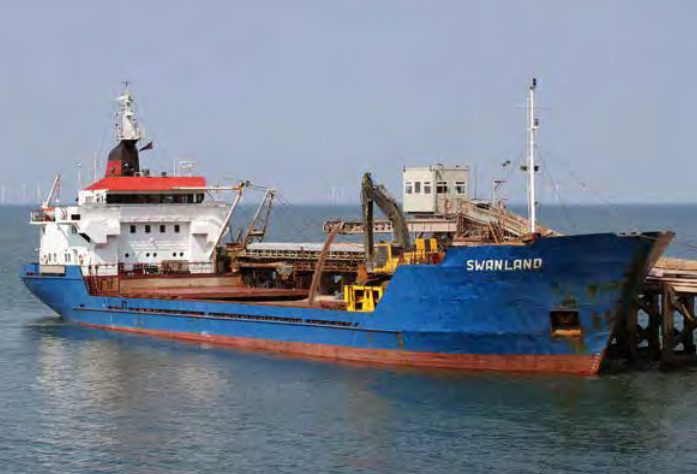Crew Rescued In Red Sea After Attack On Ship Near Yemen
CAIRO, July 6 (Reuters) – The crew of a ship set on fire in an attack in the Red Sea on Sunday abandoned the vessel and were rescued as it took on water, a British maritime agency said, in...

M/V Swanland. Image courtesy MAIB
The UK’s Marine Accident Investigation Branch has released the report on their investigation into the catastrophic hull failure and fatal sinking of the general cargo ship MV Swanland in the Irish Sea in 2011.
The master and five crew of the Cook Islands-flagged general cargo ship were killed when the 34 year old Swanland sank in just 17 minutes after suffering a catastrophic hull failure while battling heavy seas in the middle of the night on November 11, 2011. Two of the vessel’s eight crew survived after managing to swim clear and were later rescued from a liferaft. The Swanland was carrying limestone from Raynes Jetty near Colwyn Bay to Cowes on the Isle of Wight when it sank.
The wreck of Swanland was found 12 miles off the Welsh coast at a depth of approximately 80 meters. Sonar and underwater surveys showed that the vessel was inverted on the seabed, with the hull appeared to be in one piece. The upper part of the vessel’s structure had failed in the midships region, on both the starboard and port sides.
The MAIB investigation report revealed that that the major factors contributing to the structural failure of the vessel included:
Other contributing factors the MAIB report identified included: non-compliance with the International Maritime Solid Bulk Cargo Code, insufficient loading information, a lack of effective safety management, poor quality of survey and audit, lack of oversight of the classification society by the Flag State and the financial pressures of operating this type of vessel in the current economic downturn. The investigation also identified several safety issues concerning the immersion suits and lifejackets available on board the vessel.
MAIB notes that, sadly, none of the factors identified in the report are new. Swanland is just one of 248 general cargo ships that are known to have foundered worldwide since 2002 with the loss of over 800 seafarers; 226 of the vessels were 15 years old or more and 139 of which were 27 years old or more. Concerns surrounding the safety and high loss rates of similar general cargo ships have been repeatedly raised at the International Maritime Organization, MAIB said in their report.
FULL REPORT: MAIB Swanland Report.pdf (6,051.24 kb)

Sign up for gCaptain’s newsletter and never miss an update

Subscribe to gCaptain Daily and stay informed with the latest global maritime and offshore news


Stay informed with the latest maritime and offshore news, delivered daily straight to your inbox
Essential news coupled with the finest maritime content sourced from across the globe.
Sign Up